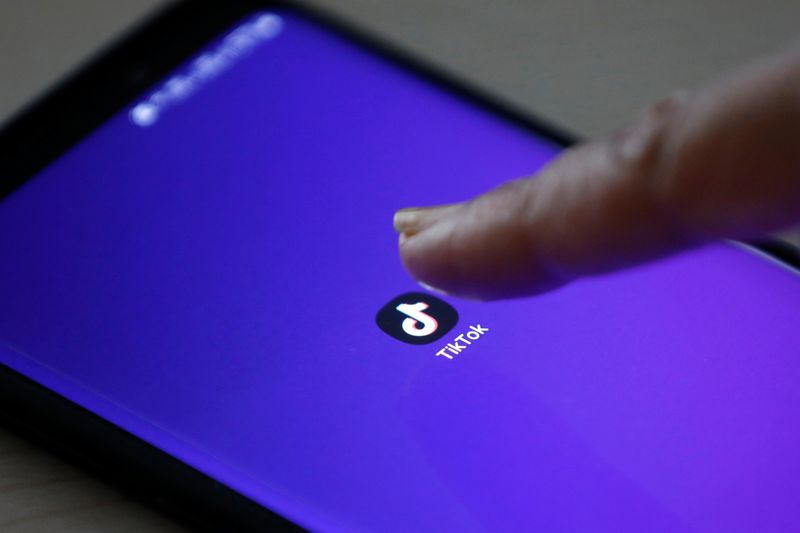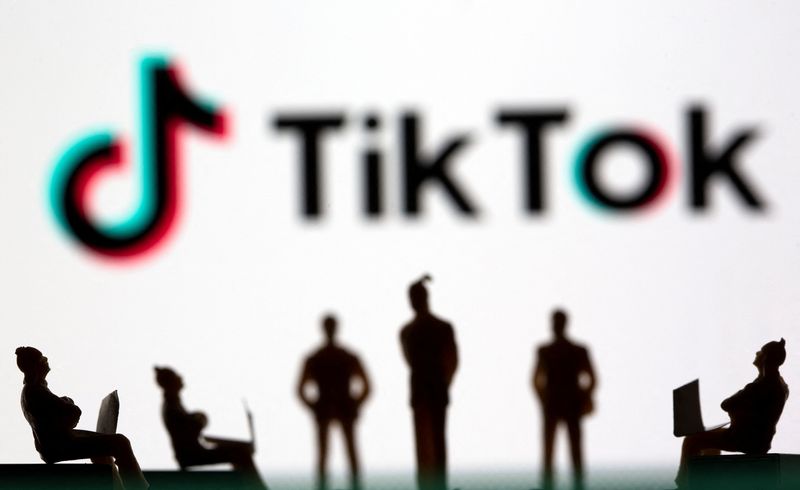By David Shepardson
WASHINGTON (Reuters) -A lawyer for TikTok and Chinese parent company ByteDance sought on Monday to convince a federal appeals court to block a U.S. law that would ban the short video app used by 170 million Americans as soon as Jan. 19, arguing that it violates free speech protections, but faced tough questions from the judges.
A three-judge panel of the U.S. Court of Appeals for the District of Columbia heard two hours of arguments in the lawsuit filed by TikTok and ByteDance in May seeking an injunction to prevent the law from taking effect.
Justice Department lawyer Daniel Tenny pressed the U.S. government's stance that TikTok, under Chinese ownership, poses a national security threat because of its access to vast amounts of personal data on Americans, asserting that China can covertly manipulate information that Americans consume via the popular app.
Andrew Pincus, the lawyer arguing for TikTok and ByteDance, told Judges Sri Srinivasan, Neomi Rao and Douglas Ginsburg that the U.S. government had not demonstrated that TikTok actually poses national security risks. Pincus also argued that the law violates the U.S. Constitution on a number of grounds including running afoul of the First Amendment protections against government abridgment of speech.
"The law before this court is unprecedented, and its effect would be staggering," Pincus told the judges, saying "for the first time in history, Congress has expressly targeted a specific U.S. speaker banning its speech and the speech of 170 million Americans."
The law gives ByteDance until Jan. 19 to sell or divest TikTok's U.S. assets or face a ban in the United States. Driven by worries that China could access data on Americans or spy on them with the app, the U.S. Congress passed the measure with overwhelming support and President Joe Biden signed it into law in April.
The lawsuit claimed that if the statute is upheld, it would show that Congress can circumvent the First Amendment "by invoking national security and ordering the publisher of any individual newspaper or website to sell to avoid being shut down."
Tenny defended the law and warned of Chinese manipulation efforts.
"It's farcical to suggest that with this two billion lines of code - 40 times as big as the entire Windows operating system, changed 1,000 times every day - that somehow we're going to detect that they've changed it," Tenny said. "There is so much happening in China outside the control of the United States that it poses a grave national security risk."
Rao cited an estimate that it could take three years to review the source code, not including updates.
"So how are you supposed to have disclosure, or verified disclosure?" Rao asked Pincus.
Rao said many of TikTok's arguments appear to want the court to treat Congress as an executive branch agency, rather than a legislature that "actually passed a law."
"It's a very strange framework" for thinking about Congress, the judge added.
Ginsburg asked why is this any different from another U.S. law that precludes foreign ownership of a broadcast license.
Srinivasan, in questioning Pincus, raised the hypothetical situation of the United States being at war with China, and whether Congress in that situation could bar foreign ownership of major media outlets operating in the United States. Pincus said Congress probably would be able to do so, but noted that lawmakers did not include that justification in the current law.
The law prohibits app stores like Apple (NASDAQ:AAPL) and Alphabet (NASDAQ:GOOGL)'s Google from offering TikTok and bars internet hosting services from supporting TikTok unless ByteDance divests TikTok by the deadline. Under the law, Biden could extend the deadline by three months if he certifies ByteDance is making significant progress toward a sale.
TikTok and the Justice Department have asked for a ruling by Dec. 6, which could allow the U.S. Supreme Court to consider any appeal before a ban takes effect.

The case is playing out during the final weeks of the U.S. presidential campaign. Republican presidential candidate Donald Trump and Vice President Kamala Harris, his Democratic rival, are active on TikTok, seeking to court younger voters.
The White House has said it wants to see Chinese-based ownership ended on national security grounds, but not a ban on TikTok. Trump, who unsuccessfully tried to ban TikTok in 2020, has said if elected in November he would not allow TikTok to be barred.
